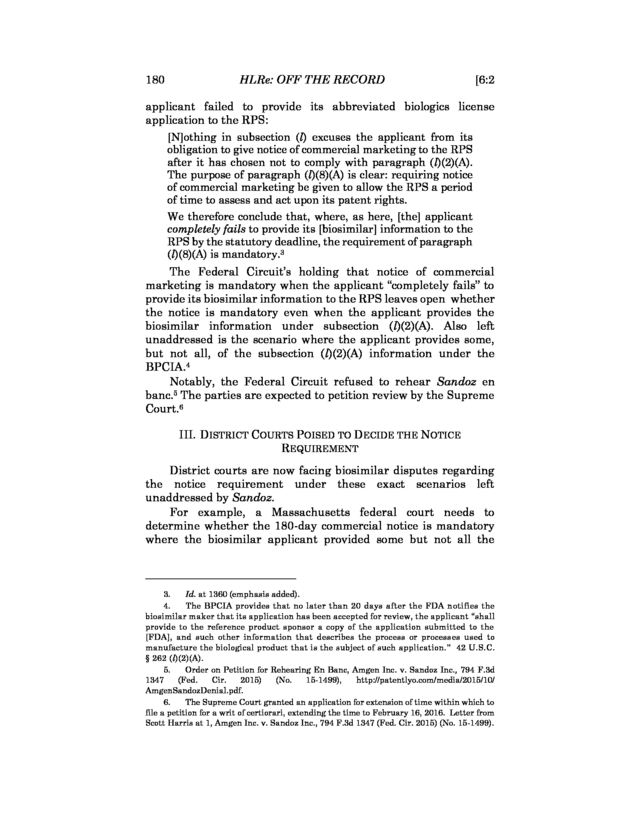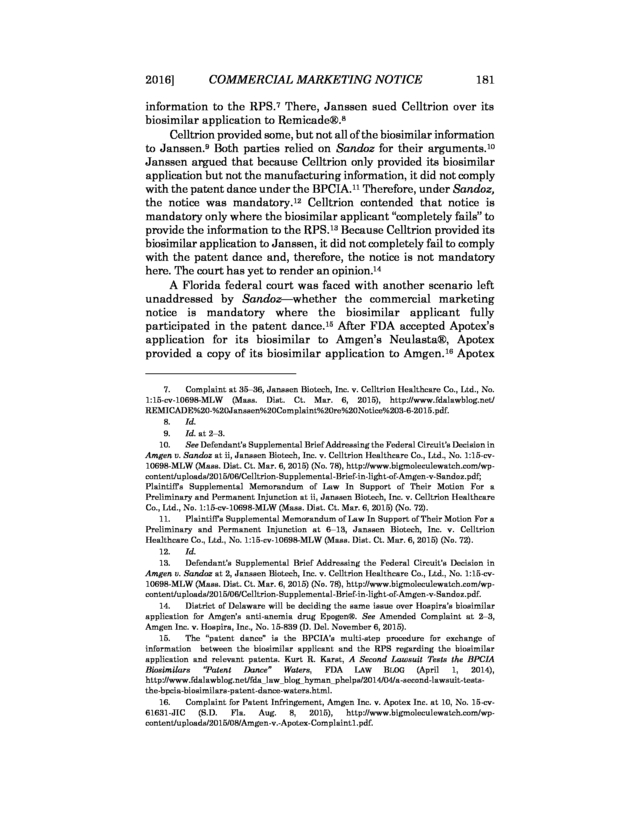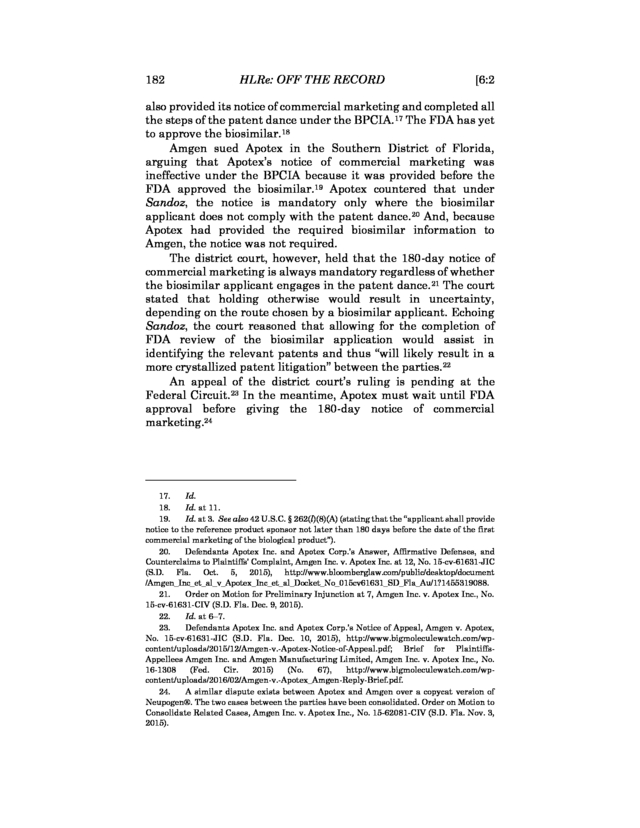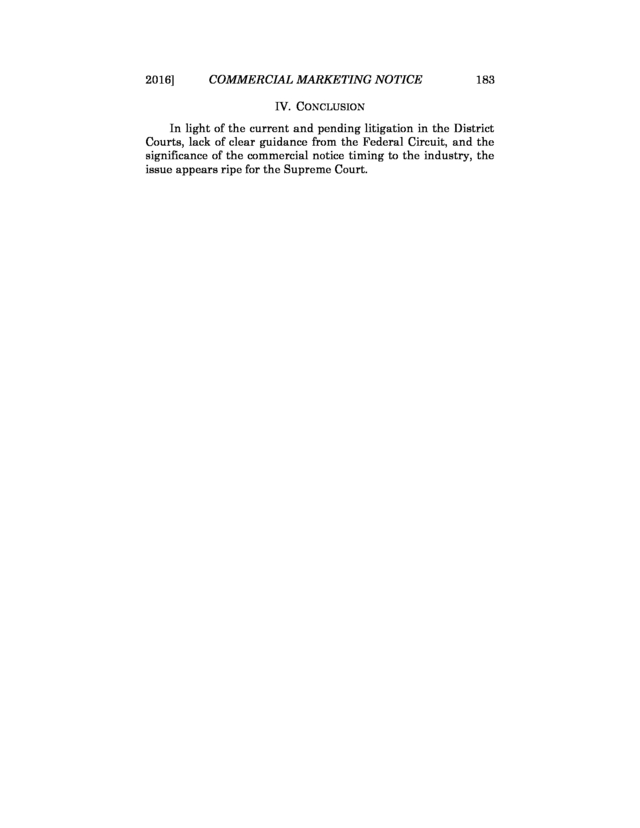Scott Cunning and Mini Kapoor for Houston Law Review: Circumstances Mandating A Commercial Marketing Notice By A Biosmilar Applicant Ripe for Guidance from the High Court – February 23, 2016
Haynes and Boone
Description
ARTICLE
CIRCUMSTANCES MANDATING A
COMMERCIAL MARKETING NOTICE BY A
BIOSIMILAR APPLICANT RIPE FOR
GUIDANCE FROM THE HIGH COURT
Scott Cunning and Mini Kapoor
I.
INTRODUCTION
Several cases are pending around the country, but no
consensus exists on the circumstances that would require a
biosimilar applicant to provide a commercial marketing notice
under the Biologics Price Competition and Innovation Act
(BPCIA).1 In light of the implications on the biosimilar’s entry to
the market, the courts’ interpretation on whether and when notice
is required is of considerable significance to the biologics and
biosimilar field.
II. FEDERAL CIRCUIT DOES NOT PROVIDE CLEAR GUIDANCE ON
CIRCUMSTANCES MANDATING THE NOTICE REQUIREMENT
In Amgen v. Sandoz,2 the Federal Circuit considered whether
a subsection (k) applicant may satisfy its obligation to give notice
of commercial marketing under the BPCIA by doing so before it
receives FDA approval. A divided panel of the Federal Circuit held
that the 180-day commercial marketing notice to the reference
product sponsor (RPS) is mandatory under the BPCIA but limited
the holding to the facts of the case, i.e., where the biosimilar

Scott Cunning is a partner in the intellectual property group in Haynes and
Boone, LLP’s Washington DC office.
Mini Kapoor is an associate in the litigation group in Haynes and Boone, LLP’s Houston office. 1. 42 U.S.C. § 262 (2012). A biosimilar is a product that meets with FDA approval due to its similarity to an already-approved product composed of biological material (i.e., a biologic).
Information for Consumers (Biosimilars), FDA (Aug. 27, 2015), http://www.fda.gov/Drugs/DevelopmentApprovalProcess/HowDrugsareDevelopedandAppr oved/ApprovalApplications/TherapeuticBiologicApplications/Biosimilars/ucm241718.htm. 2. Amgen Inc. v.
Sandoz Inc., 794 F.3d 1347 (Fed. Cir. 2015). 179 .
180 HLRe: OFF THE RECORD [6:2 applicant failed to provide its abbreviated biologics license application to the RPS: [N]othing in subsection (l) excuses the applicant from its obligation to give notice of commercial marketing to the RPS after it has chosen not to comply with paragraph (l)(2)(A). The purpose of paragraph (l)(8)(A) is clear: requiring notice of commercial marketing be given to allow the RPS a period of time to assess and act upon its patent rights. We therefore conclude that, where, as here, [the] applicant completely fails to provide its [biosimilar] information to the RPS by the statutory deadline, the requirement of paragraph (l)(8)(A) is mandatory.3 The Federal Circuit’s holding that notice of commercial marketing is mandatory when the applicant “completely fails” to provide its biosimilar information to the RPS leaves open whether the notice is mandatory even when the applicant provides the biosimilar information under subsection (l)(2)(A). Also left unaddressed is the scenario where the applicant provides some, but not all, of the subsection (l)(2)(A) information under the BPCIA.4 Notably, the Federal Circuit refused to rehear Sandoz en banc.5 The parties are expected to petition review by the Supreme Court.6 III. DISTRICT COURTS POISED TO DECIDE THE NOTICE REQUIREMENT District courts are now facing biosimilar disputes regarding the notice requirement under these exact scenarios left unaddressed by Sandoz. For example, a Massachusetts federal court needs to determine whether the 180-day commercial notice is mandatory where the biosimilar applicant provided some but not all the 3. Id. at 1360 (emphasis added). 4. The BPCIA provides that no later than 20 days after the FDA notifies the biosimilar maker that its application has been accepted for review, the applicant “shall provide to the reference product sponsor a copy of the application submitted to the [FDA], and such other information that describes the process or process es used to manufacture the biological product that is the subject of such application.
” 42 U.S.C. § 262 (l)(2)(A). 5. Order on Petition for Rehearing En Banc, Amgen Inc. v. Sandoz Inc., 794 F.3d 1347 (Fed. Cir. 2015) (No. 15-1499), http://patentlyo.com/media/2015/10/ AmgenSandozDenial.pdf. 6. The Supreme Court granted an application for extension of time within which to file a petition for a writ of certiorari, extending the time to February 16, 2016.
Letter from Scott Harris at 1, Amgen Inc. v. Sandoz Inc., 794 F.3d 1347 (Fed.
Cir. 2015) (No. 15-1499). .
2016] COMMERCIAL MARKETING NOTICE 181 information to the RPS.7 There, Janssen sued Celltrion over its biosimilar application to Remicade®.8 Celltrion provided some, but not all of the biosimilar information to Janssen.9 Both parties relied on Sandoz for their arguments.10 Janssen argued that because Celltrion only provided its biosimilar application but not the manufacturing information, it did not comply with the patent dance under the BPCIA.11 Therefore, under Sandoz, the notice was mandatory.12 Celltrion contended that notice is mandatory only where the biosimilar applicant “completely fails” to provide the information to the RPS.13 Because Celltrion provided its biosimilar application to Janssen, it did not completely fail to comply with the patent dance and, therefore, the notice is not mandatory here. The court has yet to render an opinion.14 A Florida federal court was faced with another scenario left unaddressed by Sandoz—whether the commercial marketing notice is mandatory where the biosimilar applicant fully participated in the patent dance.15 After FDA accepted Apotex’s application for its biosimilar to Amgen’s Neulasta®, Apotex provided a copy of its biosimilar application to Amgen.16 Apotex 7. Complaint at 35–36, Janssen Biotech, Inc. v. Celltrion Healthcare Co., Ltd., No. 1:15-cv-10698-MLW (Mass.
Dist. Ct. Mar.
6, 2015), http://www.fdalawblog.net/ REMICADE%20-%20Janssen%20Complaint%20re%20Notice%203-6-2015.pdf. 8. Id. 9. Id. at 2–3. 10. See Defendant’s Supplemental Brief Addressing the Federal Circuit’s Decision in Amgen v. Sandoz at ii, Janssen Biotech, Inc.
v. Celltrion Healthcare Co., Ltd., No. 1:15-cv10698-MLW (Mass.
Dist. Ct. Mar.
6, 2015) (No. 78), http://www.bigmoleculewatch.com/wpcontent/uploads/2015/06/Celltrion-Supplemental-Brief-in-light-of-Amgen-v-Sandoz.pdf; Plaintiff’s Supplemental Memorandum of Law In Support of Their Motion For a Preliminary and Permanent Injunction at ii, Janssen Biotech, Inc. v.
Celltrion Healthcare Co., Ltd., No. 1:15-cv-10698-MLW (Mass. Dist.
Ct. Mar. 6, 2015) (No.
72). 11. Plaintiff’s Supplemental Memorandum of Law In Support of Their Motion For a Preliminary and Permanent Injunction at 6–13, Janssen Biotech, Inc. v. Celltrion Healthcare Co., Ltd., No.
1:15-cv-10698-MLW (Mass. Dist. Ct.
Mar. 6, 2015) (No. 72). 12. Id. 13. Defendant’s Supplemental Brief Addressing the Federal Circuit’s Decision in Amgen v.
Sandoz at 2, Janssen Biotech, Inc. v. Celltrion Healthcare Co., Ltd., No.
1:15-cv10698-MLW (Mass. Dist. Ct.
Mar. 6, 2015) (No. 78), http://www.bigmoleculewatch.com/wpcontent/uploads/2015/06/Celltrion-Supplemental-Brief-in-light-of-Amgen-v-Sandoz.pdf. 14. District of Delaware will be deciding the same issue over Hospira’s biosimilar application for Amgen’s anti-anemia drug Epogen®.
See Amended Complaint at 2–3, Amgen Inc. v. Hospira, Inc., No.
15-839 (D. Del. November 6, 2015). 15. The “patent dance” is the BPCIA’s multi-step procedure for exchange of information between the biosimilar applicant and the RPS regarding the biosimilar application and relevant patents.
Kurt R. Karst, A Second Lawsuit Tests the BPCIA Biosimilars “Patent Dance” Waters, FDA LAW BLOG (April 1, 2014), http://www.fdalawblog.net/fda_law_blog_hyman_phelps/2014/04/a-second-lawsuit-teststhe-bpcia-biosimilars-patent-dance-waters.html. 16. Complaint for Patent Infringement, Amgen Inc. v.
Apotex Inc. at 10, No. 15-cv61631-JIC (S.D. Fla. Aug. 8, 2015), http://www.bigmoleculewatch.com/wpcontent/uploads/2015/08/Amgen-v.-Apotex-Complaint1.pdf. .
182 HLRe: OFF THE RECORD [6:2 also provided its notice of commercial marketing and completed all the steps of the patent dance under the BPCIA.17 The FDA has yet to approve the biosimilar.18 Amgen sued Apotex in the Southern District of Florida, arguing that Apotex’s notice of commercial marketing was ineffective under the BPCIA because it was provided before the FDA approved the biosimilar.19 Apotex countered that under Sandoz, the notice is mandatory only where the biosimilar applicant does not comply with the patent dance. 20 And, because Apotex had provided the required biosimilar information to Amgen, the notice was not required. The district court, however, held that the 180-day notice of commercial marketing is always mandatory regardless of whether the biosimilar applicant engages in the patent dance. 21 The court stated that holding otherwise would result in uncertainty, depending on the route chosen by a biosimilar applicant. Echoing Sandoz, the court reasoned that allowing for the completion of FDA review of the biosimilar application would assist in identifying the relevant patents and thus “will likely result in a more crystallized patent litigation” between the parties.22 An appeal of the district court’s ruling is pending at the Federal Circuit.23 In the meantime, Apotex must wait until FDA approval before giving the 180-day notice of commercial marketing.24 17. Id. 18. Id.
at 11. 19. Id. at 3. See also 42 U.S.C.
§ 262(l)(8)(A) (stating that the “applicant shall provide notice to the reference product sponsor not later than 180 days before the date of the first commercial marketing of the biological product”). 20. Defendants Apotex Inc. and Apotex Corp.’s Answer, Affirmative Defenses, and Counterclaims to Plaintiffs’ Complaint, Amgen Inc. v.
Apotex Inc. at 12, No. 15-cv-61631-JIC (S.D.
Fla. Oct. 5, 2015), http://www.bloomberglaw.com/public/desktop/document /Amgen_Inc_et_al_v_Apotex_Inc_et_al_Docket_No_015cv61631_SD_Fla_Au/1?1455319088. 21. Order on Motion for Preliminary Injunction at 7, Amgen Inc.
v. Apotex Inc., No. 15-cv-61631-CIV (S.D. Fla.
Dec. 9, 2015). 22. Id. at 6–7. 23. Defendants Apotex Inc.
and Apotex Corp.’s Notice of Appeal, Amgen v. Apotex, No. 15-cv-61631-JIC (S.D.
Fla. Dec. 10, 2015), http://www.bigmoleculewatch.com/wpcontent/uploads/2015/12/Amgen-v.-Apotex-Notice-of-Appeal.pdf; Brief for PlaintiffsAppellees Amgen Inc.
and Amgen Manufacturing Limited, Amgen Inc. v. Apotex Inc., No. 16-1308 (Fed. Cir. 2015) (No. 67), http://www.bigmoleculewatch.com/wpcontent/uploads/2016/02/Amgen-v.-Apotex_Amgen-Reply-Brief.pdf. 24. A similar dispute exists between Apotex and Amgen over a copycat version of Neupogen®.
The two cases between the parties have been consolidated. Order on Motion to Consolidate Related Cases, Amgen Inc. v.
Apotex Inc., No. 15-62081-CIV (S.D. Fla.
Nov. 3, 2015). . 2016] COMMERCIAL MARKETING NOTICE 183 IV. CONCLUSION In light of the current and pending litigation in the District Courts, lack of clear guidance from the Federal Circuit, and the significance of the commercial notice timing to the industry, the issue appears ripe for the Supreme Court. .
Mini Kapoor is an associate in the litigation group in Haynes and Boone, LLP’s Houston office. 1. 42 U.S.C. § 262 (2012). A biosimilar is a product that meets with FDA approval due to its similarity to an already-approved product composed of biological material (i.e., a biologic).
Information for Consumers (Biosimilars), FDA (Aug. 27, 2015), http://www.fda.gov/Drugs/DevelopmentApprovalProcess/HowDrugsareDevelopedandAppr oved/ApprovalApplications/TherapeuticBiologicApplications/Biosimilars/ucm241718.htm. 2. Amgen Inc. v.
Sandoz Inc., 794 F.3d 1347 (Fed. Cir. 2015). 179 .
180 HLRe: OFF THE RECORD [6:2 applicant failed to provide its abbreviated biologics license application to the RPS: [N]othing in subsection (l) excuses the applicant from its obligation to give notice of commercial marketing to the RPS after it has chosen not to comply with paragraph (l)(2)(A). The purpose of paragraph (l)(8)(A) is clear: requiring notice of commercial marketing be given to allow the RPS a period of time to assess and act upon its patent rights. We therefore conclude that, where, as here, [the] applicant completely fails to provide its [biosimilar] information to the RPS by the statutory deadline, the requirement of paragraph (l)(8)(A) is mandatory.3 The Federal Circuit’s holding that notice of commercial marketing is mandatory when the applicant “completely fails” to provide its biosimilar information to the RPS leaves open whether the notice is mandatory even when the applicant provides the biosimilar information under subsection (l)(2)(A). Also left unaddressed is the scenario where the applicant provides some, but not all, of the subsection (l)(2)(A) information under the BPCIA.4 Notably, the Federal Circuit refused to rehear Sandoz en banc.5 The parties are expected to petition review by the Supreme Court.6 III. DISTRICT COURTS POISED TO DECIDE THE NOTICE REQUIREMENT District courts are now facing biosimilar disputes regarding the notice requirement under these exact scenarios left unaddressed by Sandoz. For example, a Massachusetts federal court needs to determine whether the 180-day commercial notice is mandatory where the biosimilar applicant provided some but not all the 3. Id. at 1360 (emphasis added). 4. The BPCIA provides that no later than 20 days after the FDA notifies the biosimilar maker that its application has been accepted for review, the applicant “shall provide to the reference product sponsor a copy of the application submitted to the [FDA], and such other information that describes the process or process es used to manufacture the biological product that is the subject of such application.
” 42 U.S.C. § 262 (l)(2)(A). 5. Order on Petition for Rehearing En Banc, Amgen Inc. v. Sandoz Inc., 794 F.3d 1347 (Fed. Cir. 2015) (No. 15-1499), http://patentlyo.com/media/2015/10/ AmgenSandozDenial.pdf. 6. The Supreme Court granted an application for extension of time within which to file a petition for a writ of certiorari, extending the time to February 16, 2016.
Letter from Scott Harris at 1, Amgen Inc. v. Sandoz Inc., 794 F.3d 1347 (Fed.
Cir. 2015) (No. 15-1499). .
2016] COMMERCIAL MARKETING NOTICE 181 information to the RPS.7 There, Janssen sued Celltrion over its biosimilar application to Remicade®.8 Celltrion provided some, but not all of the biosimilar information to Janssen.9 Both parties relied on Sandoz for their arguments.10 Janssen argued that because Celltrion only provided its biosimilar application but not the manufacturing information, it did not comply with the patent dance under the BPCIA.11 Therefore, under Sandoz, the notice was mandatory.12 Celltrion contended that notice is mandatory only where the biosimilar applicant “completely fails” to provide the information to the RPS.13 Because Celltrion provided its biosimilar application to Janssen, it did not completely fail to comply with the patent dance and, therefore, the notice is not mandatory here. The court has yet to render an opinion.14 A Florida federal court was faced with another scenario left unaddressed by Sandoz—whether the commercial marketing notice is mandatory where the biosimilar applicant fully participated in the patent dance.15 After FDA accepted Apotex’s application for its biosimilar to Amgen’s Neulasta®, Apotex provided a copy of its biosimilar application to Amgen.16 Apotex 7. Complaint at 35–36, Janssen Biotech, Inc. v. Celltrion Healthcare Co., Ltd., No. 1:15-cv-10698-MLW (Mass.
Dist. Ct. Mar.
6, 2015), http://www.fdalawblog.net/ REMICADE%20-%20Janssen%20Complaint%20re%20Notice%203-6-2015.pdf. 8. Id. 9. Id. at 2–3. 10. See Defendant’s Supplemental Brief Addressing the Federal Circuit’s Decision in Amgen v. Sandoz at ii, Janssen Biotech, Inc.
v. Celltrion Healthcare Co., Ltd., No. 1:15-cv10698-MLW (Mass.
Dist. Ct. Mar.
6, 2015) (No. 78), http://www.bigmoleculewatch.com/wpcontent/uploads/2015/06/Celltrion-Supplemental-Brief-in-light-of-Amgen-v-Sandoz.pdf; Plaintiff’s Supplemental Memorandum of Law In Support of Their Motion For a Preliminary and Permanent Injunction at ii, Janssen Biotech, Inc. v.
Celltrion Healthcare Co., Ltd., No. 1:15-cv-10698-MLW (Mass. Dist.
Ct. Mar. 6, 2015) (No.
72). 11. Plaintiff’s Supplemental Memorandum of Law In Support of Their Motion For a Preliminary and Permanent Injunction at 6–13, Janssen Biotech, Inc. v. Celltrion Healthcare Co., Ltd., No.
1:15-cv-10698-MLW (Mass. Dist. Ct.
Mar. 6, 2015) (No. 72). 12. Id. 13. Defendant’s Supplemental Brief Addressing the Federal Circuit’s Decision in Amgen v.
Sandoz at 2, Janssen Biotech, Inc. v. Celltrion Healthcare Co., Ltd., No.
1:15-cv10698-MLW (Mass. Dist. Ct.
Mar. 6, 2015) (No. 78), http://www.bigmoleculewatch.com/wpcontent/uploads/2015/06/Celltrion-Supplemental-Brief-in-light-of-Amgen-v-Sandoz.pdf. 14. District of Delaware will be deciding the same issue over Hospira’s biosimilar application for Amgen’s anti-anemia drug Epogen®.
See Amended Complaint at 2–3, Amgen Inc. v. Hospira, Inc., No.
15-839 (D. Del. November 6, 2015). 15. The “patent dance” is the BPCIA’s multi-step procedure for exchange of information between the biosimilar applicant and the RPS regarding the biosimilar application and relevant patents.
Kurt R. Karst, A Second Lawsuit Tests the BPCIA Biosimilars “Patent Dance” Waters, FDA LAW BLOG (April 1, 2014), http://www.fdalawblog.net/fda_law_blog_hyman_phelps/2014/04/a-second-lawsuit-teststhe-bpcia-biosimilars-patent-dance-waters.html. 16. Complaint for Patent Infringement, Amgen Inc. v.
Apotex Inc. at 10, No. 15-cv61631-JIC (S.D. Fla. Aug. 8, 2015), http://www.bigmoleculewatch.com/wpcontent/uploads/2015/08/Amgen-v.-Apotex-Complaint1.pdf. .
182 HLRe: OFF THE RECORD [6:2 also provided its notice of commercial marketing and completed all the steps of the patent dance under the BPCIA.17 The FDA has yet to approve the biosimilar.18 Amgen sued Apotex in the Southern District of Florida, arguing that Apotex’s notice of commercial marketing was ineffective under the BPCIA because it was provided before the FDA approved the biosimilar.19 Apotex countered that under Sandoz, the notice is mandatory only where the biosimilar applicant does not comply with the patent dance. 20 And, because Apotex had provided the required biosimilar information to Amgen, the notice was not required. The district court, however, held that the 180-day notice of commercial marketing is always mandatory regardless of whether the biosimilar applicant engages in the patent dance. 21 The court stated that holding otherwise would result in uncertainty, depending on the route chosen by a biosimilar applicant. Echoing Sandoz, the court reasoned that allowing for the completion of FDA review of the biosimilar application would assist in identifying the relevant patents and thus “will likely result in a more crystallized patent litigation” between the parties.22 An appeal of the district court’s ruling is pending at the Federal Circuit.23 In the meantime, Apotex must wait until FDA approval before giving the 180-day notice of commercial marketing.24 17. Id. 18. Id.
at 11. 19. Id. at 3. See also 42 U.S.C.
§ 262(l)(8)(A) (stating that the “applicant shall provide notice to the reference product sponsor not later than 180 days before the date of the first commercial marketing of the biological product”). 20. Defendants Apotex Inc. and Apotex Corp.’s Answer, Affirmative Defenses, and Counterclaims to Plaintiffs’ Complaint, Amgen Inc. v.
Apotex Inc. at 12, No. 15-cv-61631-JIC (S.D.
Fla. Oct. 5, 2015), http://www.bloomberglaw.com/public/desktop/document /Amgen_Inc_et_al_v_Apotex_Inc_et_al_Docket_No_015cv61631_SD_Fla_Au/1?1455319088. 21. Order on Motion for Preliminary Injunction at 7, Amgen Inc.
v. Apotex Inc., No. 15-cv-61631-CIV (S.D. Fla.
Dec. 9, 2015). 22. Id. at 6–7. 23. Defendants Apotex Inc.
and Apotex Corp.’s Notice of Appeal, Amgen v. Apotex, No. 15-cv-61631-JIC (S.D.
Fla. Dec. 10, 2015), http://www.bigmoleculewatch.com/wpcontent/uploads/2015/12/Amgen-v.-Apotex-Notice-of-Appeal.pdf; Brief for PlaintiffsAppellees Amgen Inc.
and Amgen Manufacturing Limited, Amgen Inc. v. Apotex Inc., No. 16-1308 (Fed. Cir. 2015) (No. 67), http://www.bigmoleculewatch.com/wpcontent/uploads/2016/02/Amgen-v.-Apotex_Amgen-Reply-Brief.pdf. 24. A similar dispute exists between Apotex and Amgen over a copycat version of Neupogen®.
The two cases between the parties have been consolidated. Order on Motion to Consolidate Related Cases, Amgen Inc. v.
Apotex Inc., No. 15-62081-CIV (S.D. Fla.
Nov. 3, 2015). . 2016] COMMERCIAL MARKETING NOTICE 183 IV. CONCLUSION In light of the current and pending litigation in the District Courts, lack of clear guidance from the Federal Circuit, and the significance of the commercial notice timing to the industry, the issue appears ripe for the Supreme Court. .



















